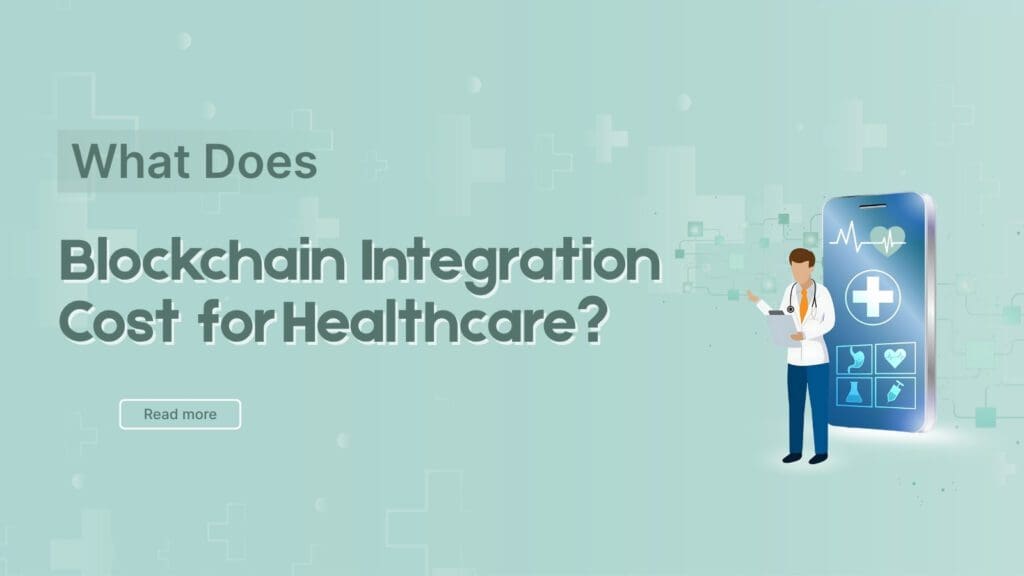
Blockchain is transforming many industries, and healthcare is no exception. As organizations seek better data security, interoperability, and efficiency, blockchain integration has become a hot topic. But how much does integrating blockchain into healthcare systems cost? Whether you’re a healthcare provider considering blockchain development services or a decision-maker exploring custom blockchain development solutions, understanding the costs involved is crucial. We’ll explore why blockchain matters in modern healthcare, break down cost components, and share strategies to manage expenses—all in clear, human-friendly language.
Why Blockchain Matters in Modern Healthcare
Healthcare data is sensitive and complex. Patient records, billing information, research data—handling all this requires secure, efficient systems. Traditional centralized databases often fall short, prone to breaches, data silos, and errors. Blockchain offers a decentralized and tamper-proof ledger that can transform the healthcare industry. One of its key advantages is enhancing data security. With cryptographic features, patient information becomes highly resistant to hacking and unauthorized modifications, creating a safer environment for sensitive healthcare data.
Another significant benefit is improved data interoperability. Blockchain allows different healthcare providers to securely share and verify patient records without the risk of duplication or errors. This seamless exchange helps ensure that all parties have accurate and up-to-date information, which is essential for effective patient care. Additionally, blockchain increases transparency across the healthcare ecosystem. Every transaction recorded is traceable, which builds greater trust among patients, providers, and regulators alike. This transparency promotes accountability and simplifies regulatory compliance.
Finally, blockchain can streamline various healthcare processes, from claims handling to supply chain management. By automating these workflows, it speeds up operations and reduces costs and administrative burdens. Because of these transformative benefits, many healthcare organizations are partnering with blockchain development companies and using custom blockchain development services to create tailored solutions that meet their unique needs.
Factors Influencing Blockchain Integration Costs in Healthcare
Before diving into numbers, it’s important to understand the main factors that influence the cost of blockchain integration in healthcare:
-
Technology Infrastructure
Setting up the right hardware and software environment can be costly. Blockchain nodes require secure servers, reliable networking, and robust data storage solutions. Whether you choose a public blockchain, private blockchain, or hybrid, your infrastructure needs will differ, affecting cost.
-
Customization and Development
No two healthcare organizations are alike, so custom blockchain development is often necessary. Developing smart contracts, custom APIs, and integration with existing Electronic Health Record (EHR) systems takes time and skilled expertise. The complexity of workflows and data formats plays a big role here.
-
Regulatory Compliance and Security
Healthcare is heavily regulated, with strict standards like HIPAA in the US and GDPR in Europe. Ensuring blockchain solutions comply with these regulations requires specialized knowledge and additional security audits, which add to development and maintenance costs.
-
Staff Training and Change Management
Implementing blockchain means training staff and sometimes redesigning business processes. To support this learning curve, using mentoring software can help guide employees through new workflows and technologies, providing structured guidance and ongoing support to ensure smooth adoption and maximize the benefits of blockchain implementation.
Breakdown of Blockchain Integration Cost Components
Understanding the specific cost components helps healthcare organizations budget effectively. Here’s a breakdown:
-
Software and Licensing Fees
Depending on the blockchain platform chosen (e.g., Ethereum, Hyperledger Fabric, Corda), there may be licensing fees or subscription costs. Some platforms are open-source but might require paid enterprise support.
-
Hardware and Network Setup
Running blockchain nodes requires servers with high availability and security. For private blockchains, the organization may need to invest in data centers or cloud infrastructure.
-
Development and Implementation Expenses
This is often the largest expense in blockchain integration. It covers custom development work, such as creating smart contracts and applications tailored to healthcare needs. It also includes integrating the blockchain solution with existing healthcare IT systems to ensure seamless operation. Additionally, thorough testing and quality assurance are essential to deliver a reliable product. Project management and consulting services further contribute to the overall cost. While hiring a professional blockchain development company or custom blockchain development service can help streamline these complex processes, it may also increase the investment required.
-
Maintenance and Support Costs
Post-deployment support is critical for updates, security patches, and troubleshooting. Many blockchain solutions operate continuously, so ongoing maintenance contracts are common.
Cost Estimates-Small vs. Large Healthcare Organizations
The scale of a healthcare organization plays a significant role in determining the cost of blockchain integration. For small clinics and practices, blockchain projects typically range from $50,000 to $150,000. These implementations tend to be more limited in scope, often focused on securing patient records or enabling basic data sharing between providers. In contrast, large hospitals and healthcare systems face much higher costs. Due to their complex workflows and numerous integration points, expenses can exceed $500,000 and may even surpass $1 million. This higher cost reflects the need for custom development, adherence to regulatory compliance, and comprehensive staff training to ensure smooth adoption across the organization.
Beyond organization size, other factors also influence costs. Geographic location can affect development rates, while the expertise and reputation of the blockchain development company play a role. Additionally, costs vary depending on whether the project leverages existing blockchain platforms or involves building proprietary solutions from the ground up.
Benefits vs. Costs- Is Blockchain Integration Worth It?
At first glance, blockchain integration may seem expensive. However, the potential benefits often outweigh the initial costs:
-
Enhanced Data Security and Privacy
Blockchain helps prevent costly data breaches by providing a highly secure and immutable record system. This level of security not only protects sensitive patient information but also builds greater trust between patients and healthcare providers, reassuring them that their data is handled with the utmost care.
-
Improved Data Interoperability
By enabling seamless and secure sharing of medical records across different healthcare providers, blockchain reduces redundant tests and errors. This improved interoperability leads to more accurate diagnoses, better coordinated care, and ultimately, enhanced patient outcomes.
-
Operational Efficiency
Blockchain automates various administrative processes such as claims processing, billing, and supply chain management. This automation reduces paperwork, speeds up transactions, and lowers administrative costs, freeing up healthcare staff to focus more on patient care.
-
Regulatory Compliance
Blockchain’s transparent and tamper-proof record-keeping simplifies audits and regulatory reporting. It ensures that all necessary documentation is accurate and easily accessible, helping healthcare organizations meet strict compliance standards with less effort and risk.
-
Long-Term Savings
Over time, blockchain reduces fraud, accelerates payment cycles, and streamlines operational workflows. These improvements can lead to substantial financial savings, potentially amounting to millions of dollars, making the initial investment in blockchain integration worthwhile.
Healthcare organizations that invest wisely in blockchain solutions from experienced blockchain development companies often see a strong return on investment.
Strategies to Manage and Reduce Blockchain Integration Costs
If you’re concerned about blockchain integration costs, here are some strategies to keep expenses manageable:
-
Choose the Right Blockchain Platform
Open-source platforms like Hyperledger Fabric or Ethereum offer flexibility without hefty licensing fees. However, weigh this against the cost of customization and support.
-
Start Small with Pilot Projects
Begin with a small use case, such as patient identity management, before expanding. This phased approach limits upfront costs and demonstrates value early.
-
Leverage Custom Blockchain Development Services
Partnering with a skilled blockchain development company can reduce risks, speed up deployment, and optimize costs through experience.
-
Utilize Cloud-Based Blockchain Solutions
Cloud services offer scalable infrastructure without large capital investments in hardware.
-
Seek Grants and Partnerships
Governments and industry groups often provide funding for innovative healthcare technology projects. Collaborating with other healthcare providers or tech firms can also help share costs.
Ready to Explore Blockchain for Your Healthcare Organization?
Integrating blockchain technology in healthcare is a significant investment but one that promises lasting benefits in security, efficiency, and patient care. Understanding the cost factors and working with trusted blockchain development companies can help you build tailored blockchain solutions that fit your organization’s unique needs. Whether you need end-to-end blockchain development services or a custom blockchain development partner to enhance your existing systems, planning your investment wisely is key. Start by assessing your current challenges, identifying high-impact use cases, and selecting experienced blockchain developers who understand healthcare’s complexities. Blockchain is not just a buzzword—it’s a powerful tool that, when implemented thoughtfully, can transform healthcare delivery for the better.






